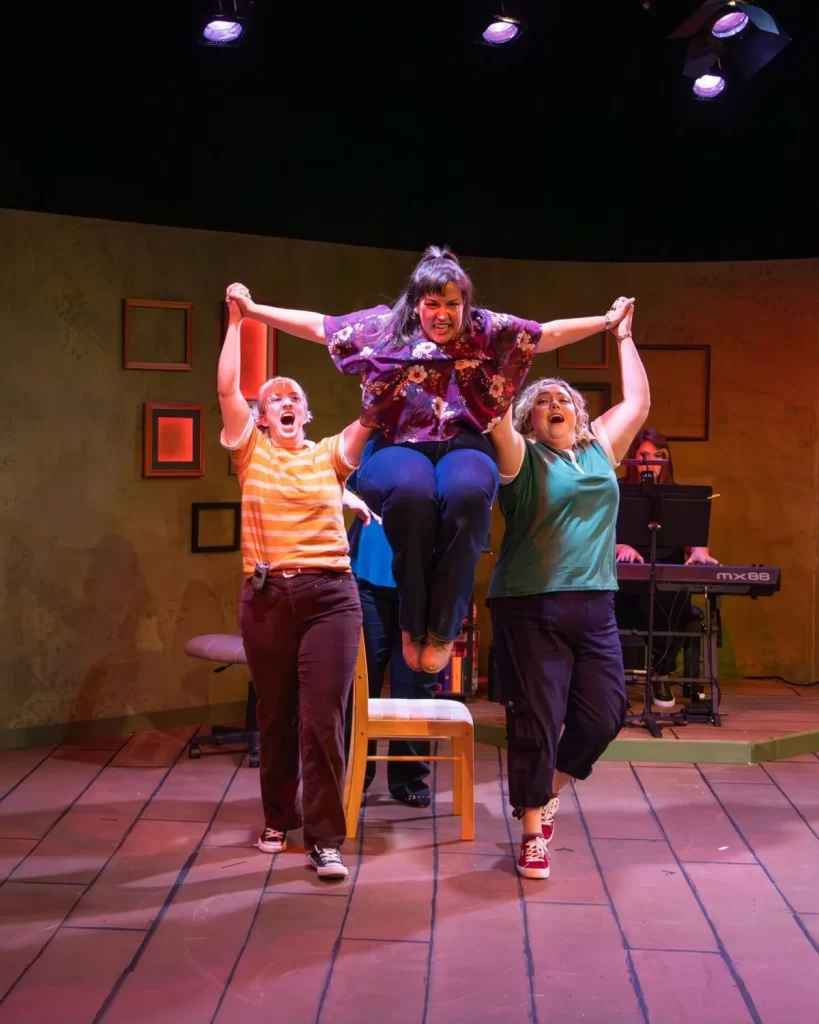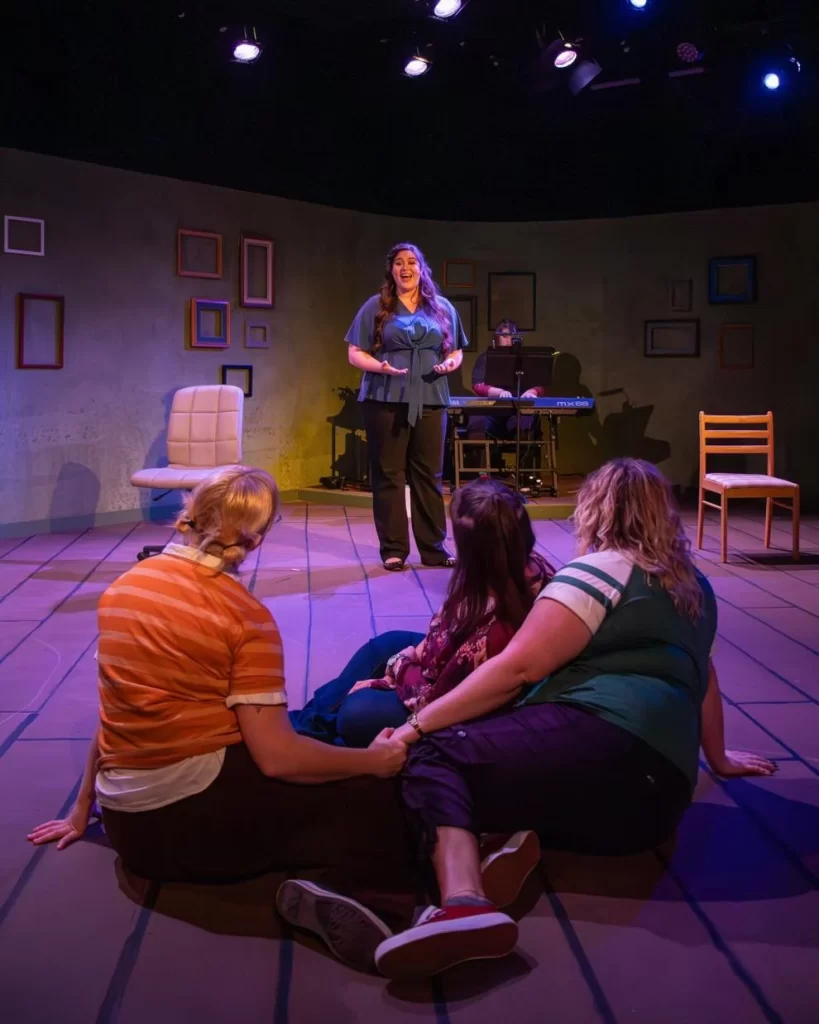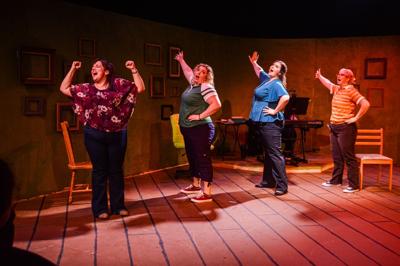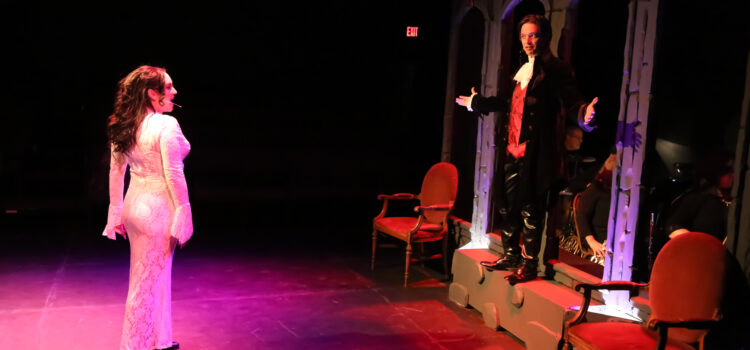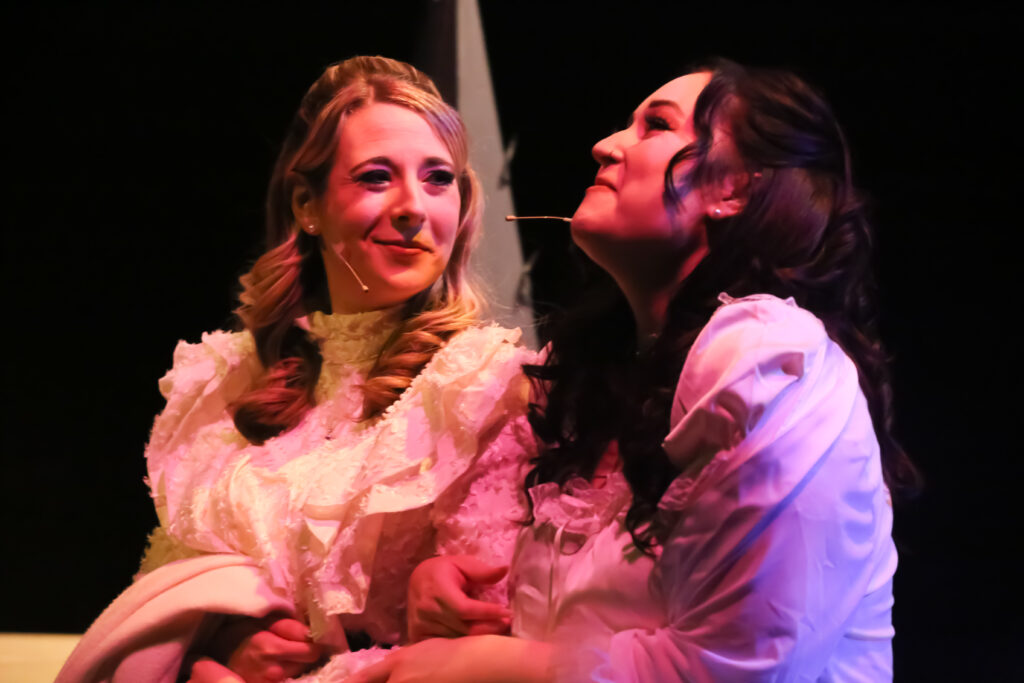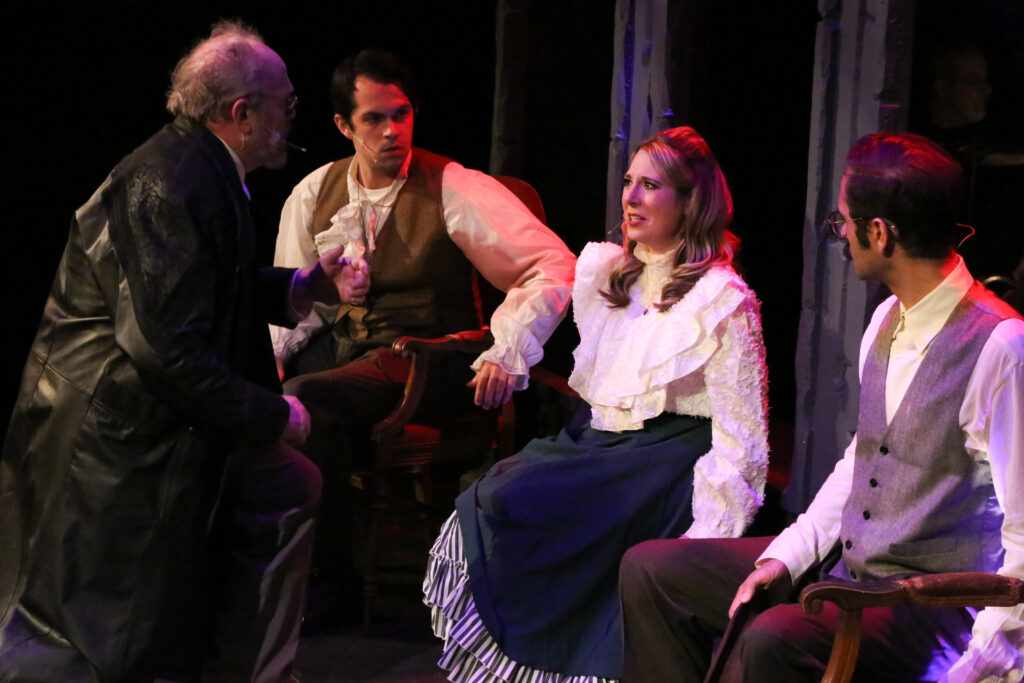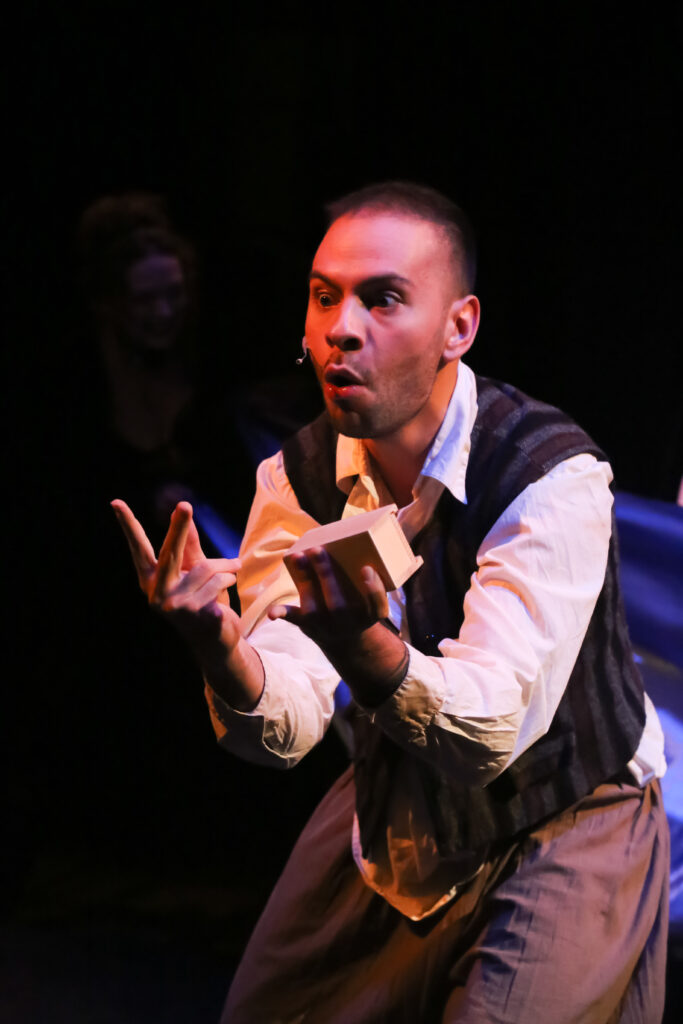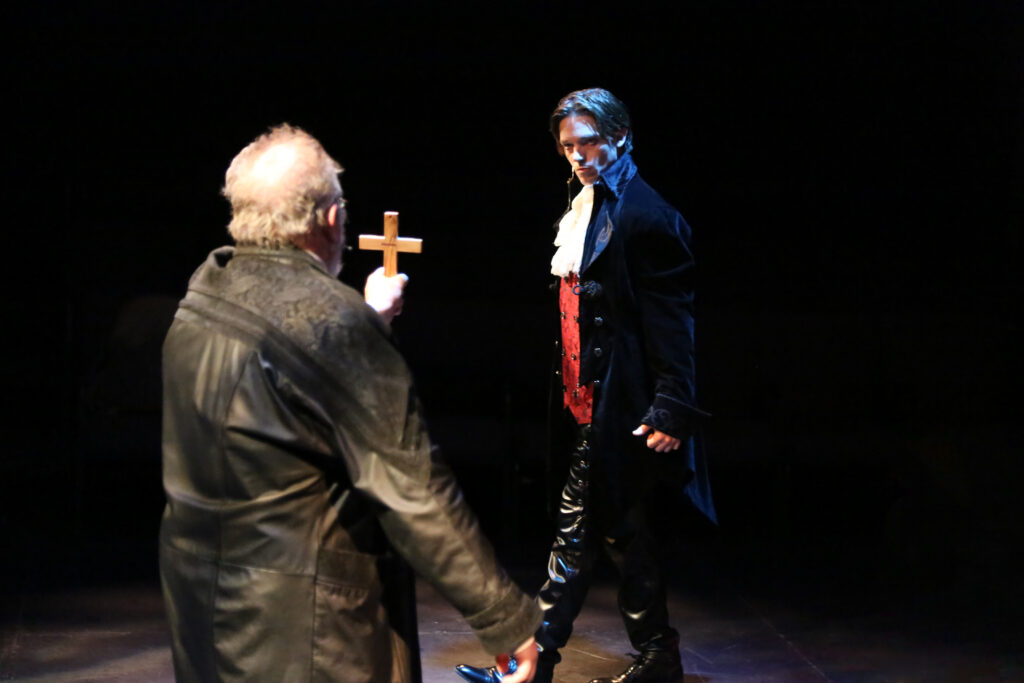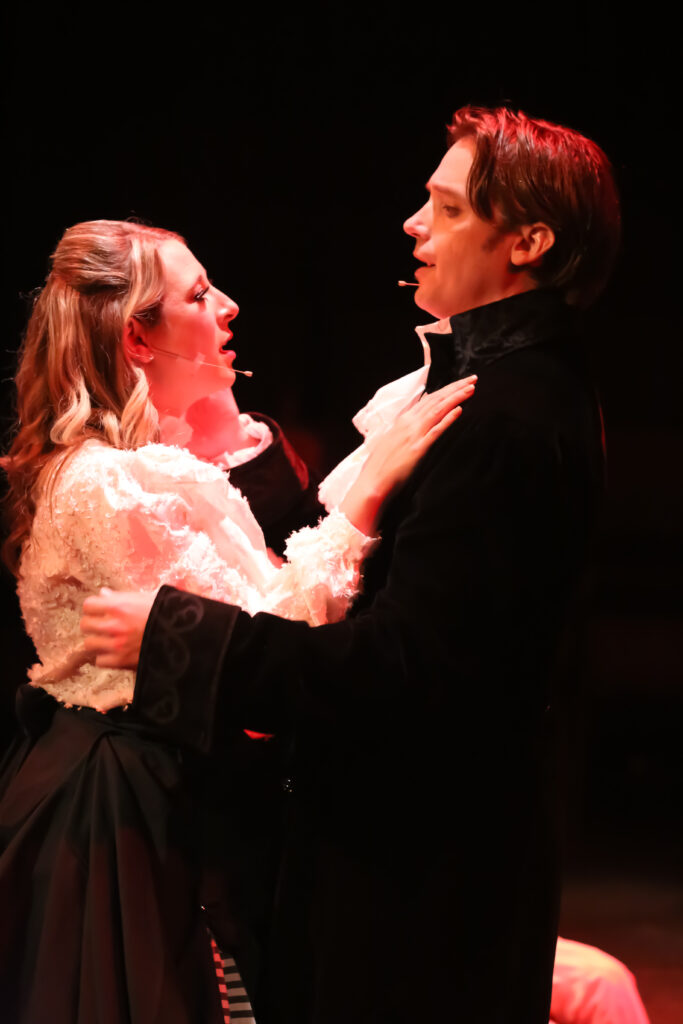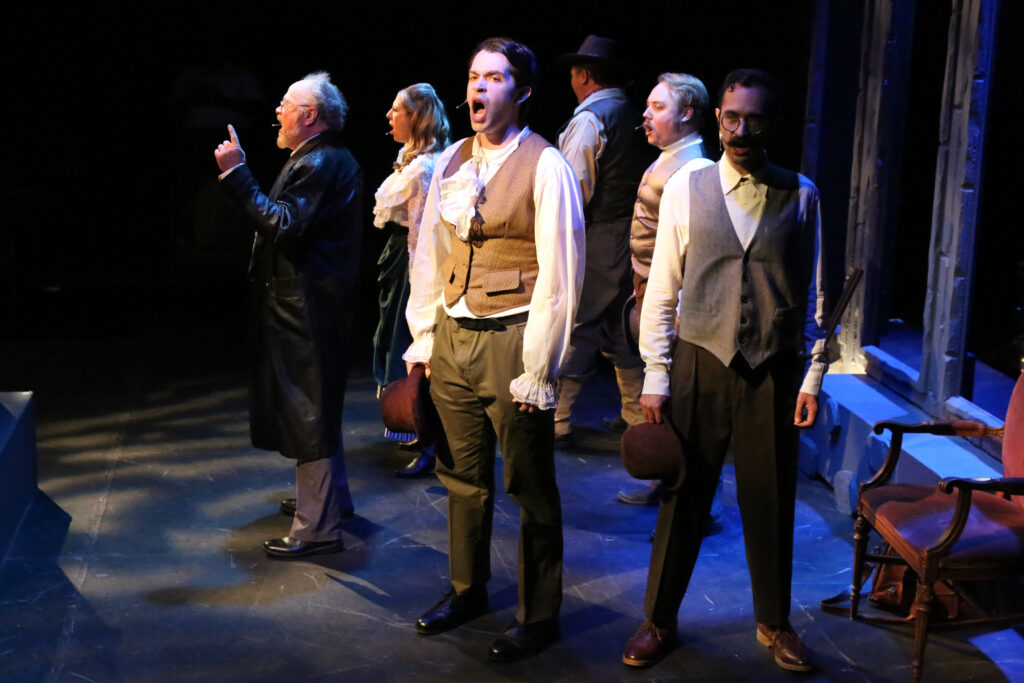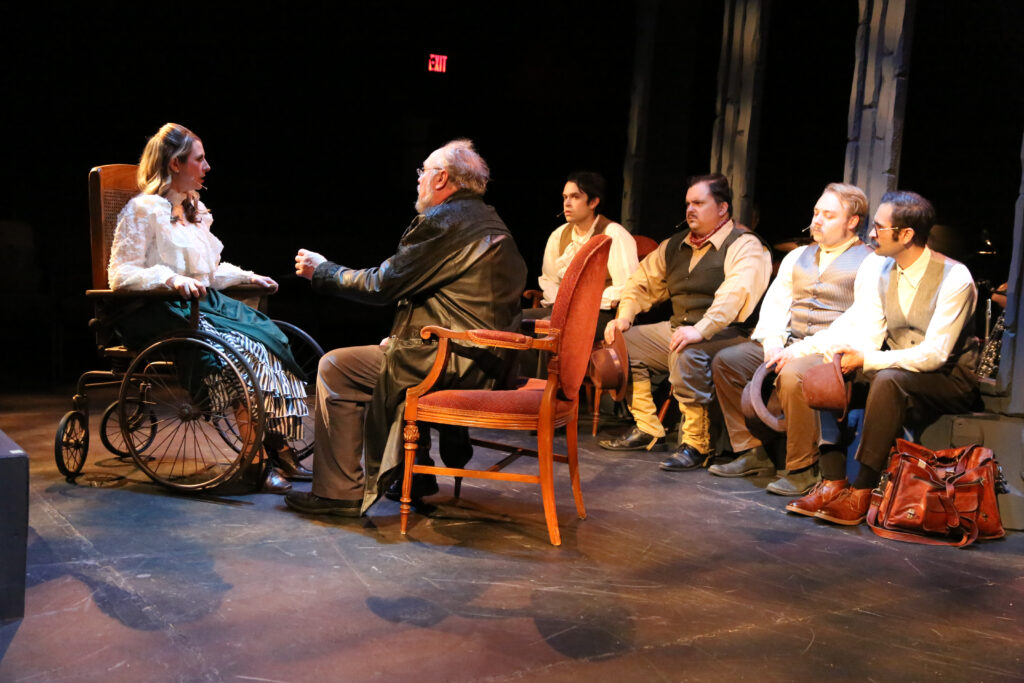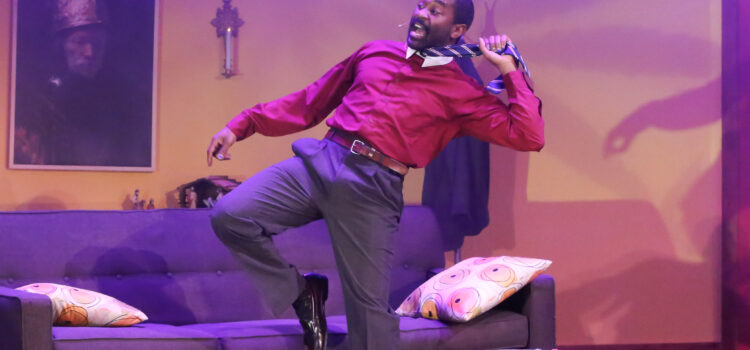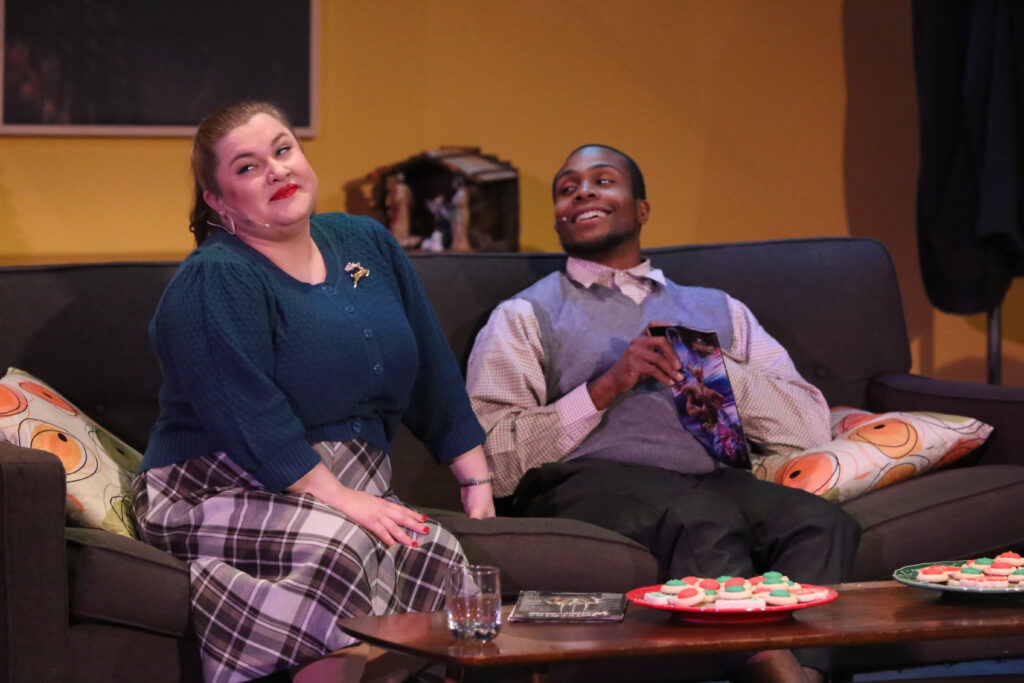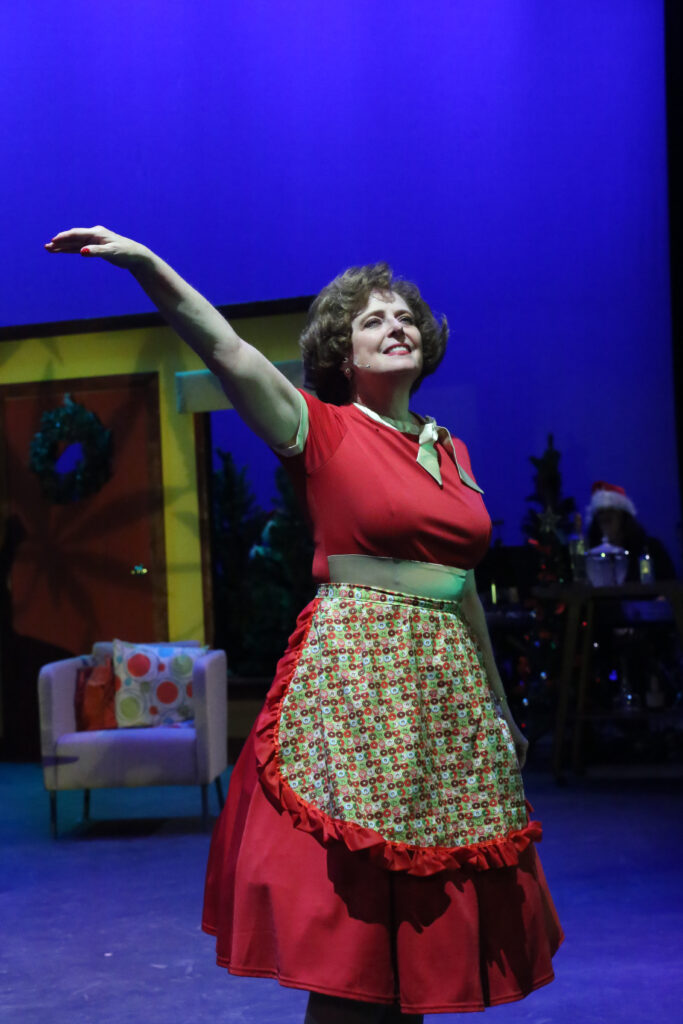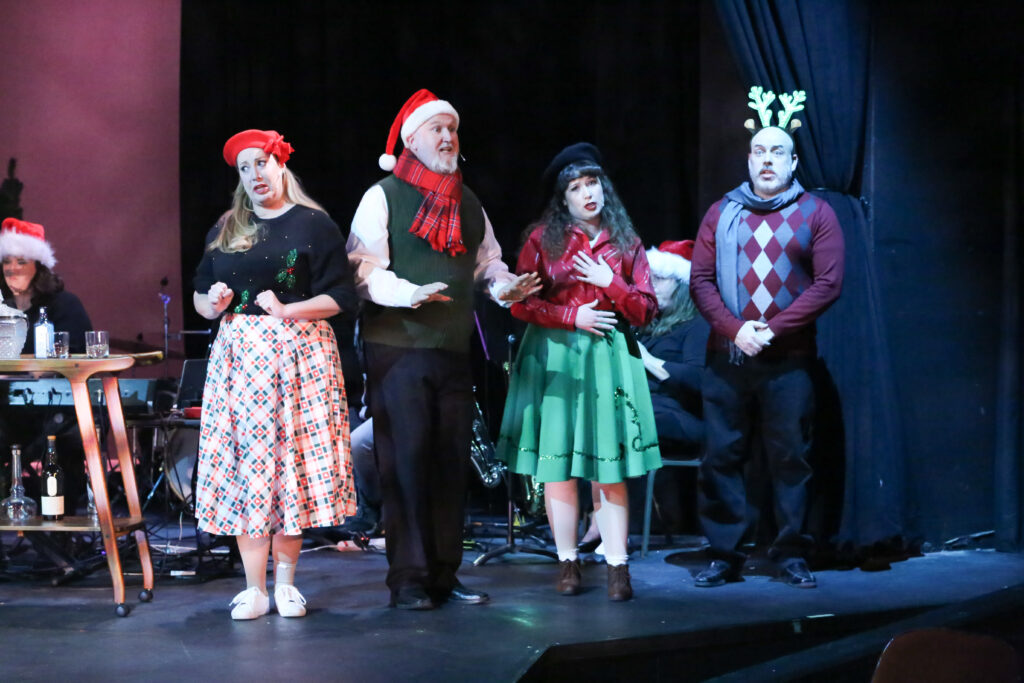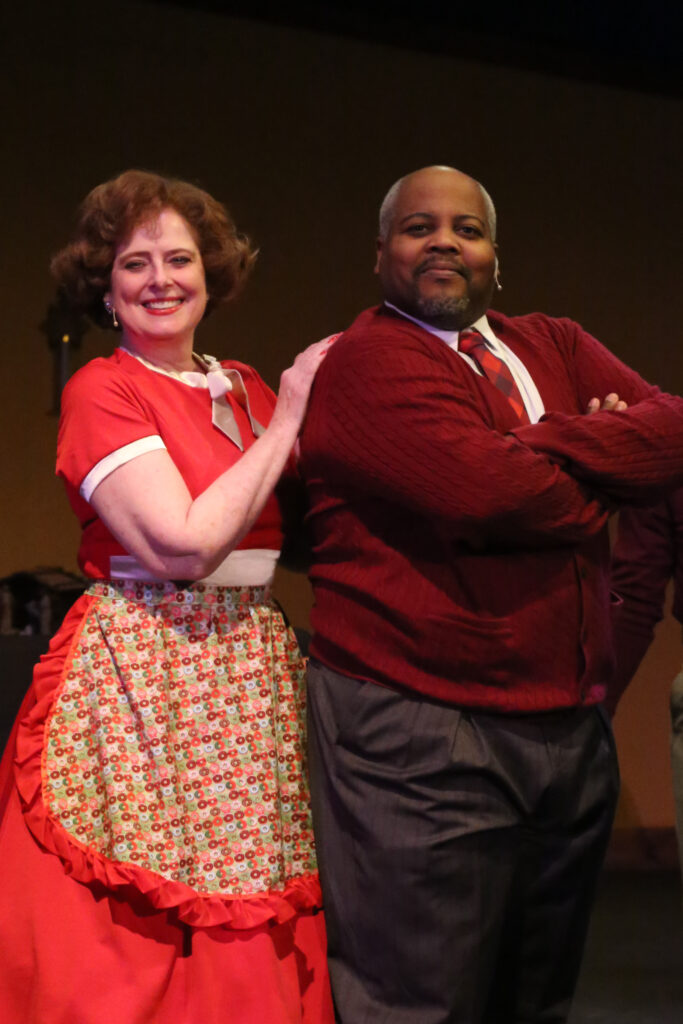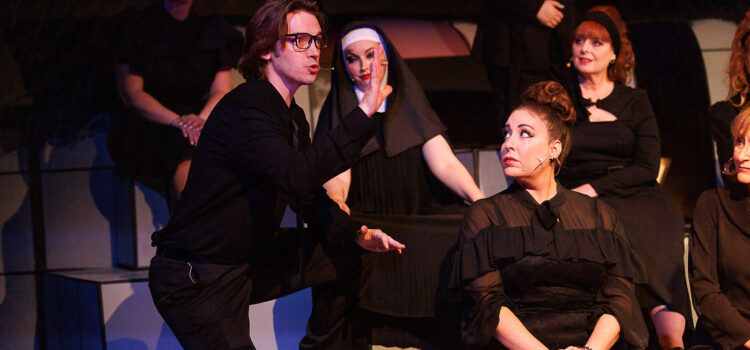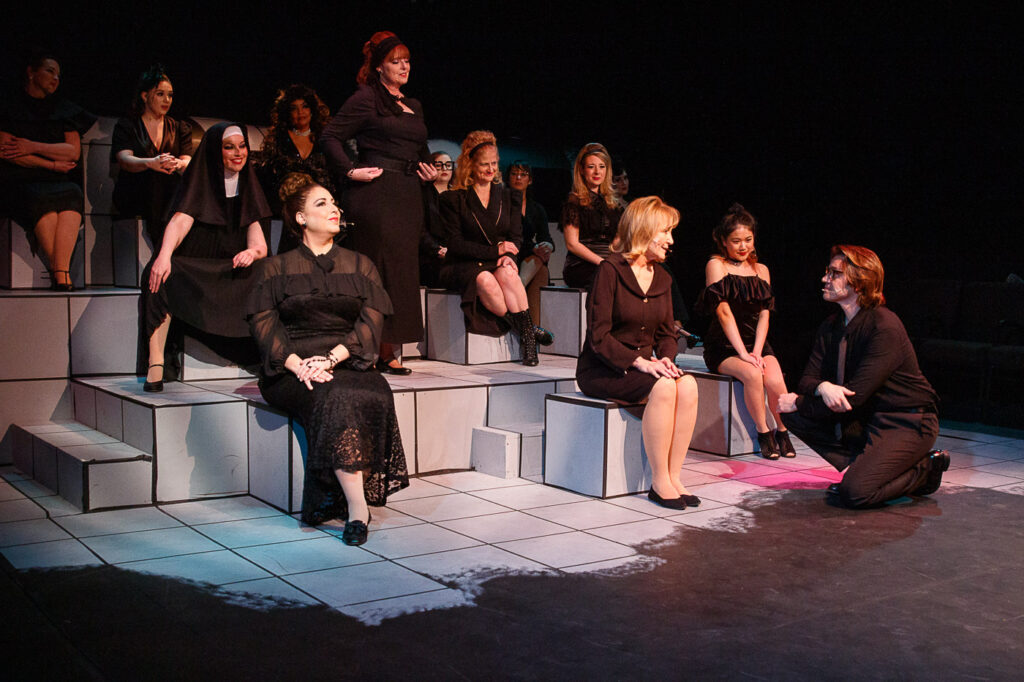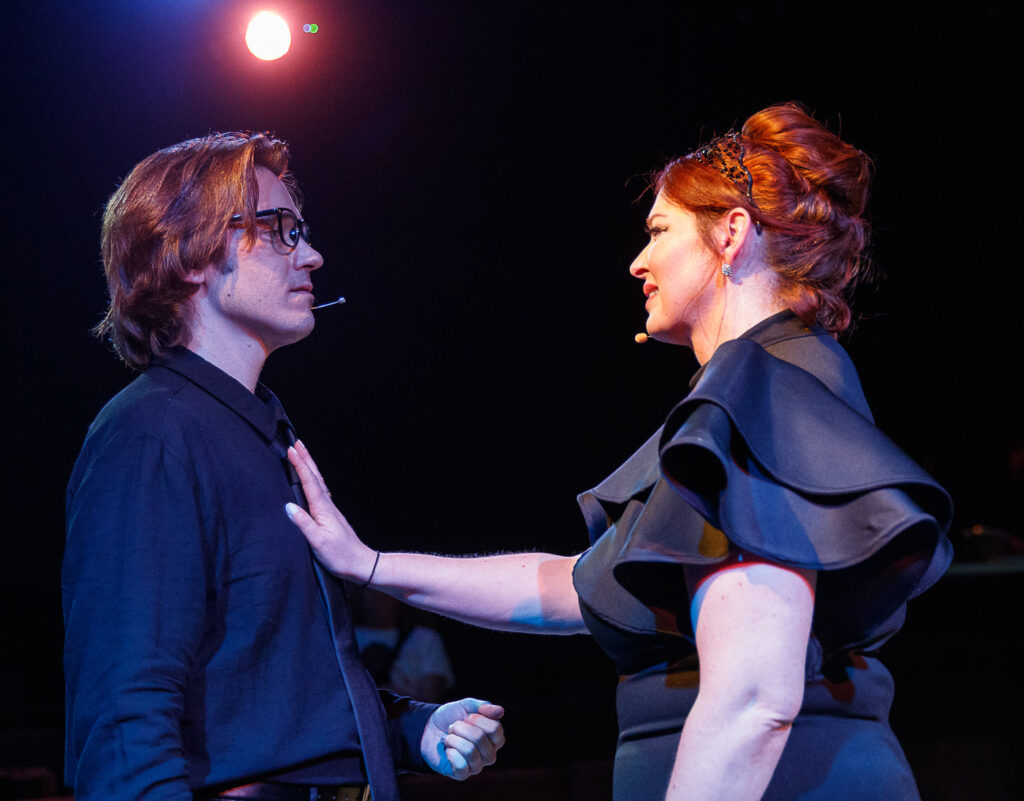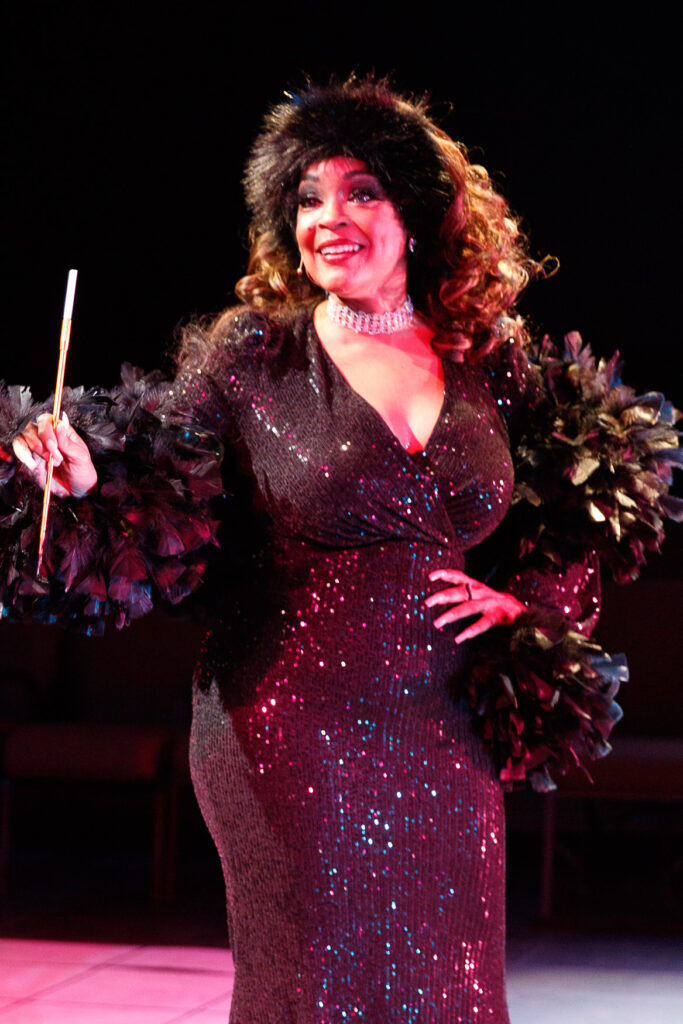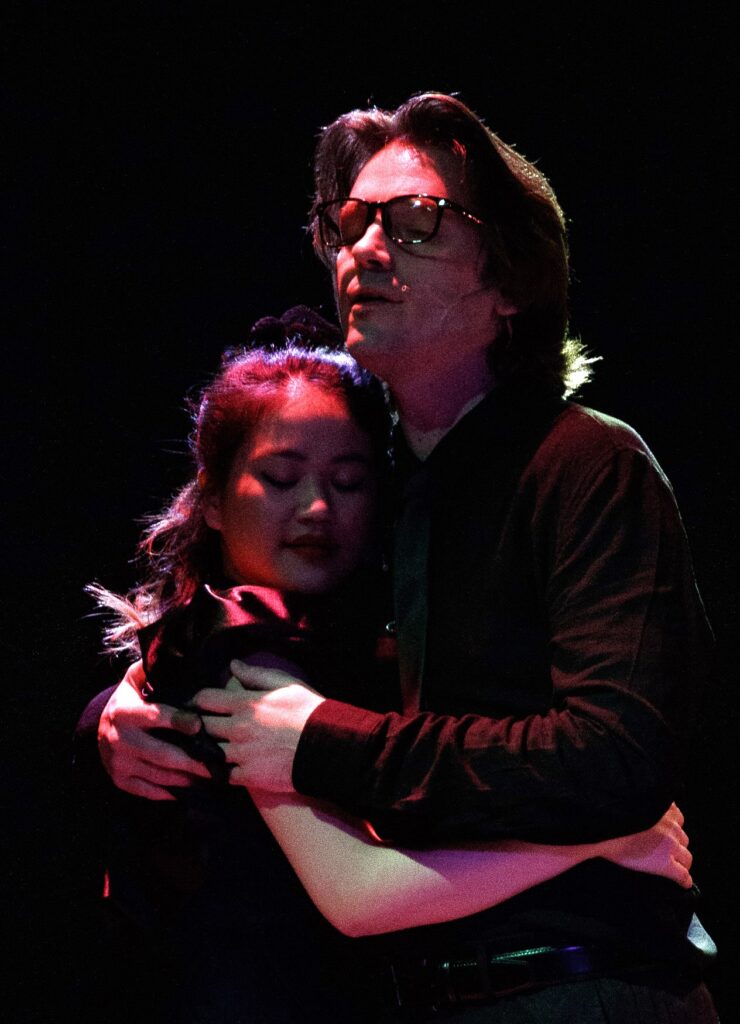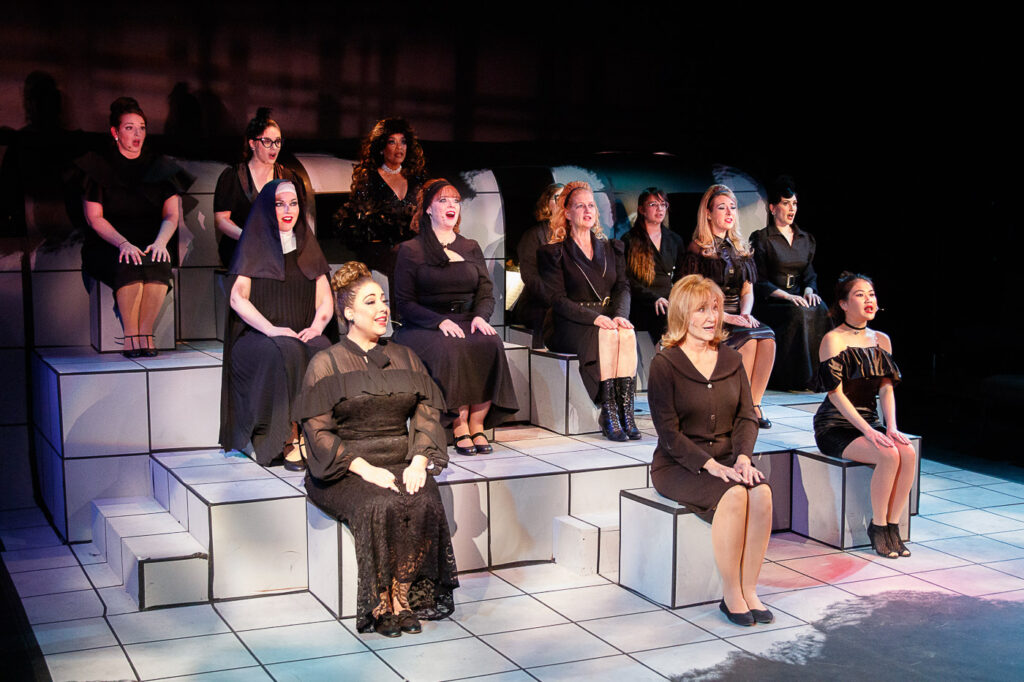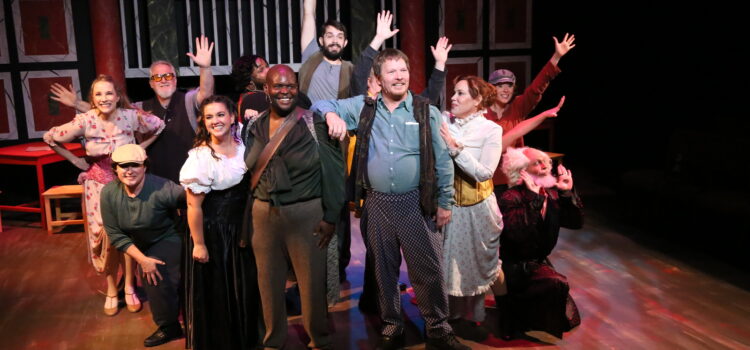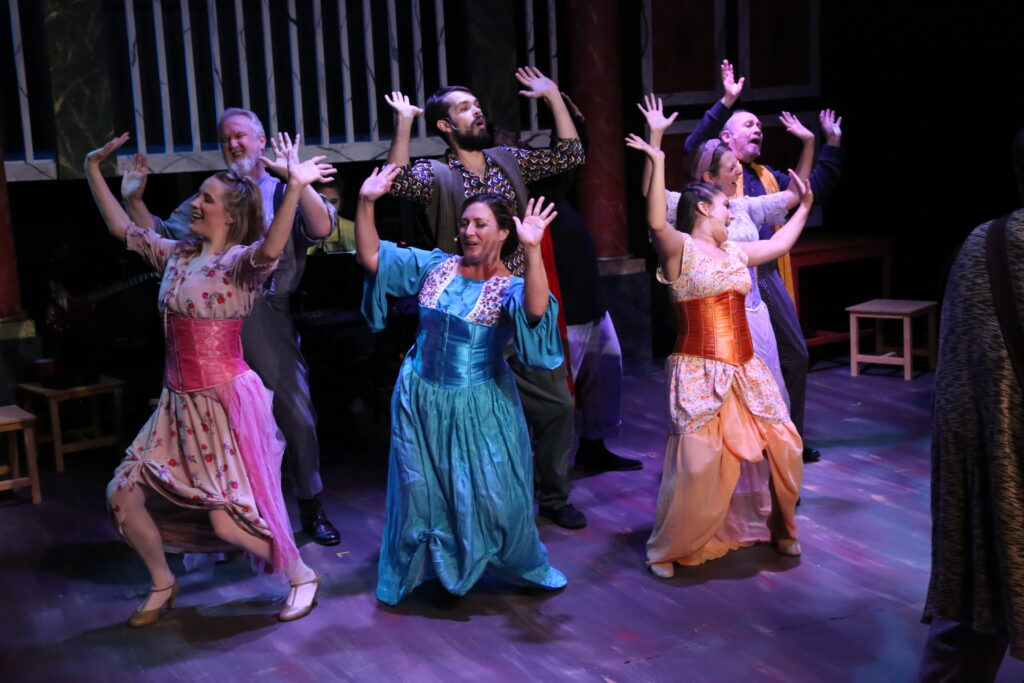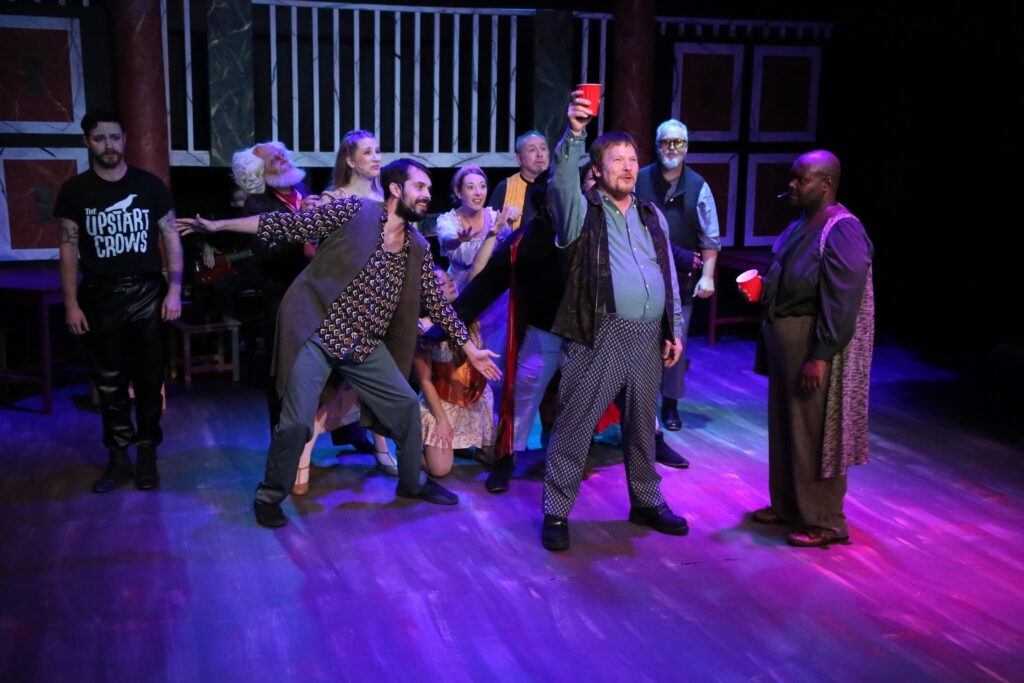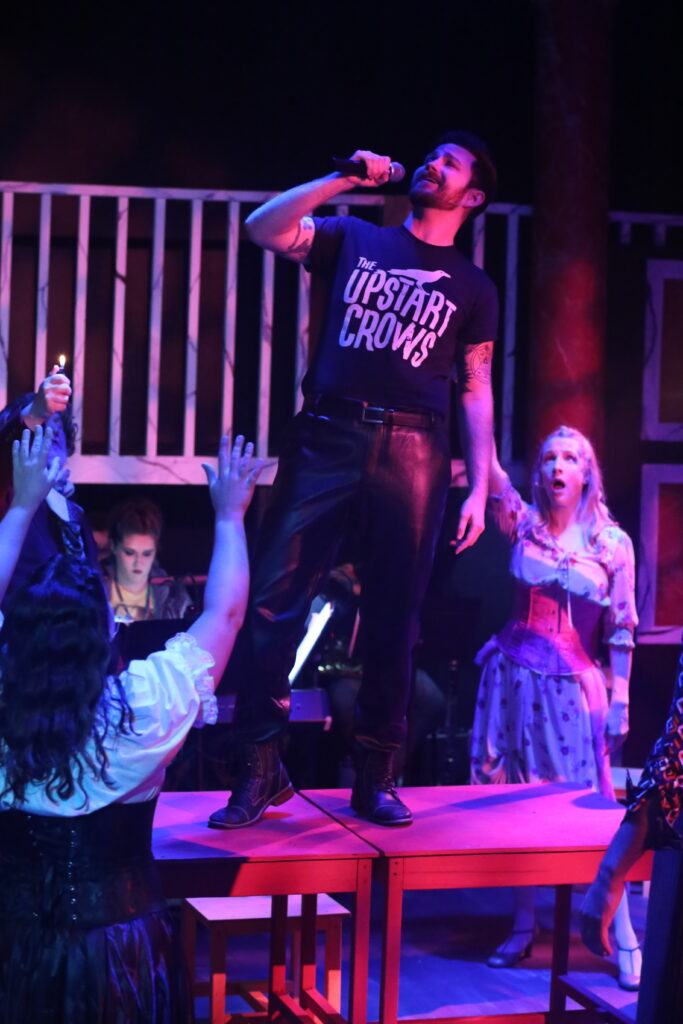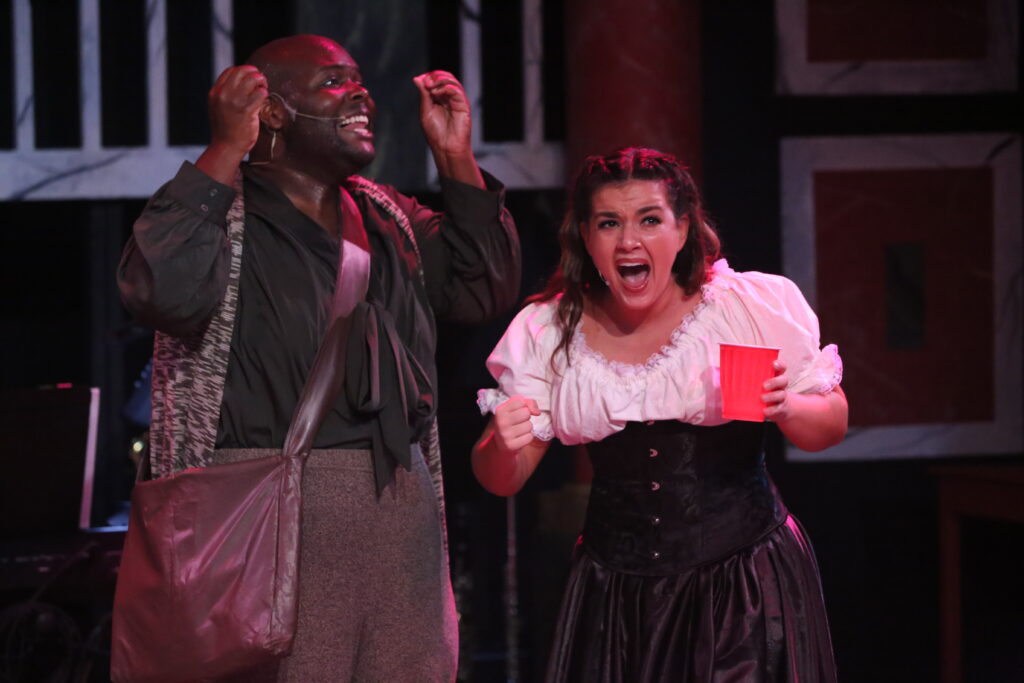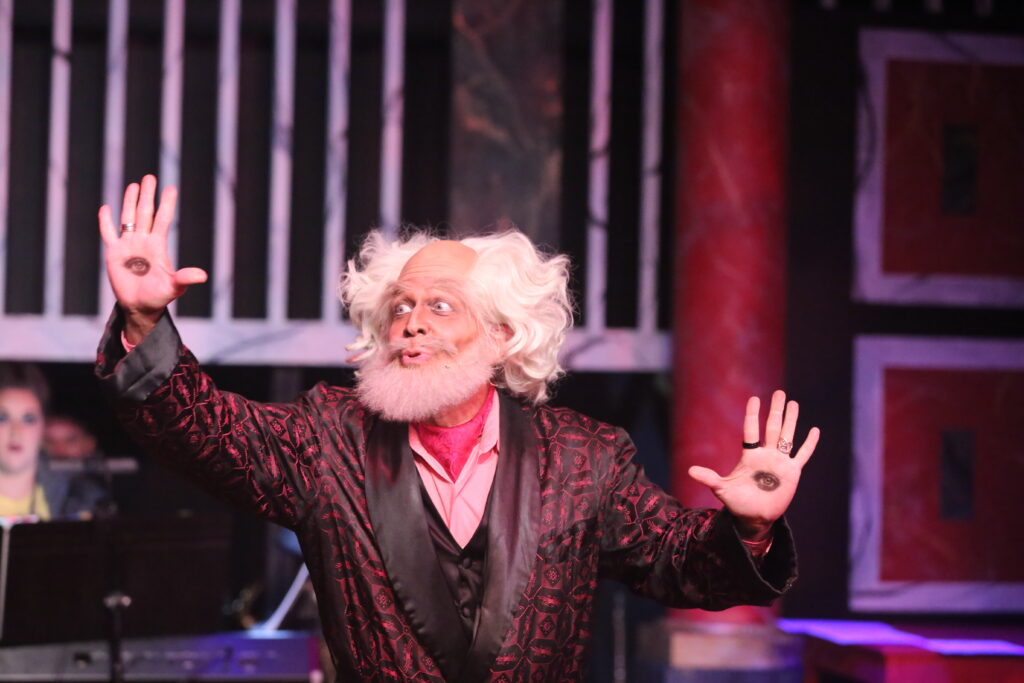By Lynn Venhaus
An electric cast brings to life Green Day’s turbo-charged punk rock opera “American Idiot,” accompanied by an exceptional group of eight musicians whose propulsive rhythms invigorate New Line Theatre’s 98th production.
New Line first presented this youthful alienation statement as a regional premiere in 2016, and with a fresh crop of performers, has turned The Marcelle Theatre into a scorching experience that ramps up passion and urgency. Heads will be banged.
Green Day’s 2004 Grammy-winning rock album “American Idiot,” its seventh, is combined with additional songs from their “21st Century Breakdown” album in 2009 and previously unreleased material.
For the stage adaptation, it was formatted as a coming-of-age tale that delved into disillusionment in post-9-11 America. The explosive, in-your-face 2010 Broadway show was nominated for three Tony Awards, including best musical, and won two – for scenic and lighting designs.
Frontman Billie Joe Armstrong collaborated with director Michael Mayer to write the book, which attacked George W. Bush’s presidency, corporate greed, warmongering (“the War on Terror” in Afghanistan and Iraq), hypocrisy in politics, and being submissive, paranoid and apathetic, fueled by mass media.

Guided by familiar songs that are rooted in realism, the ensemble is full of energy and attitude, snarling and in pain, confused about their lives’ directions as they struggle to find meaning. They hit the ground running with the title song “American Idiot” and crank it up to 11 from there. You always feel their convictions, no matter how dark it gets.
The ensemble’s momentum is strong in the group numbers, but also in the small vignettes that presents snapshots of lives in transition. Because there is minimal dialogue, the emotions must be conveyed to fill in the blanks about their confusion and malaise.
Temptations beckon ‘in the big city,’ relationships are messy, and the women seemed destined for disillusionment – with strong vocal showings from Lauren Tenenbaum as Whatshername, Adrienne Spann as Extraordinary Girl, and Rachel Parker as Heather.
Directors Chris Moore and Scott Miller have focused on the constant motion aspect of the material, where the band’s raw punk power is maintained, and the performers’ vibrancy comes through, even when playing angsty, restless characters.
Triple threats Clayton Humburg, Rafael DaCosta and DeAnte Bryant are a tight-knit trio of friends — Johnny, Tunny and Will, who are alternately angry and apathetic young men seeking to flee the stifling conformity of suburbia.
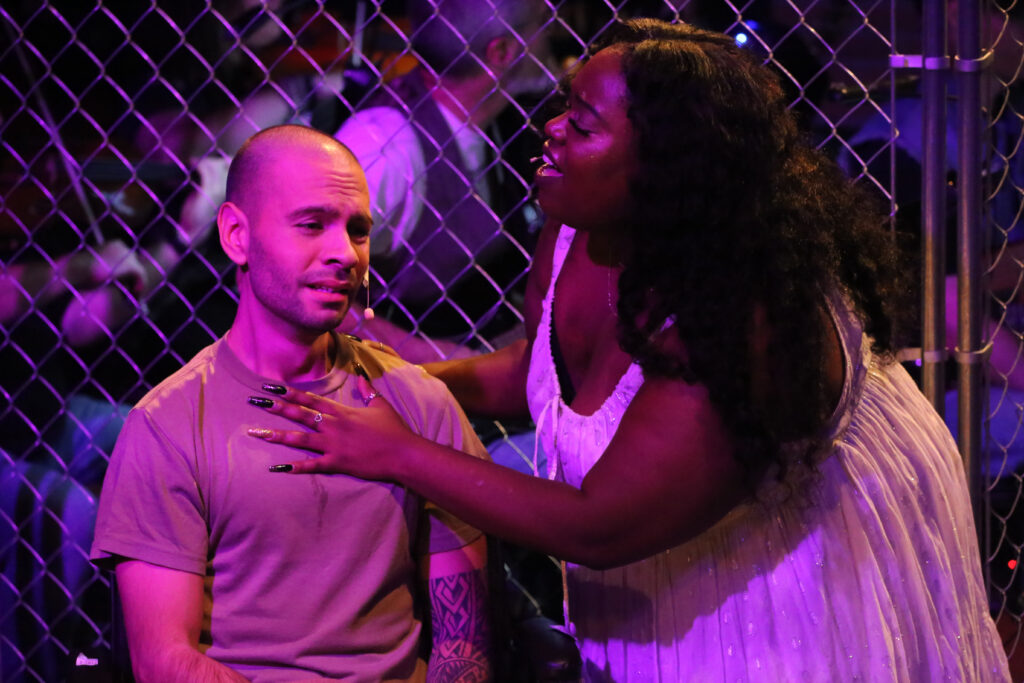
Their robust voices harmonize as they verbalize their distress in “City of the Damned” and “I Don’t Care,” and their feelings coalesce in the soulful ballad “Wake Me Up When September Ends” with the company.
They are visibly agitated in several numbers, including “Tales of a Broken Home” trying to make sense of a world that keeps spinning and not in good ways.
Rebel without a cause, Johnny aka “Jesus of Suburbia,” just wants to be anesthetized and escape in most situations, saying yes to drugs and no to hygiene: “Give Me Novacaine” but shows a hopeful side in “Last of the American Girls” and “She’s a Rebel.”
Living in squalor, wallowing in drug hazes, not being nice to his “dream girl” that gets away, and wrestling inner demons, he hooks up with bad idea drug dealer St. Jimmy.
As a hero’s journey lynchpin, Johnny isn’t a sympathetic character, but Humburg’s verve for every role he takes on comes through, so that he demands you pay attention: Will he self-destruct or get it together? And he’s a naturally compelling performer, so you hope Johnny moves beyond cynicism.
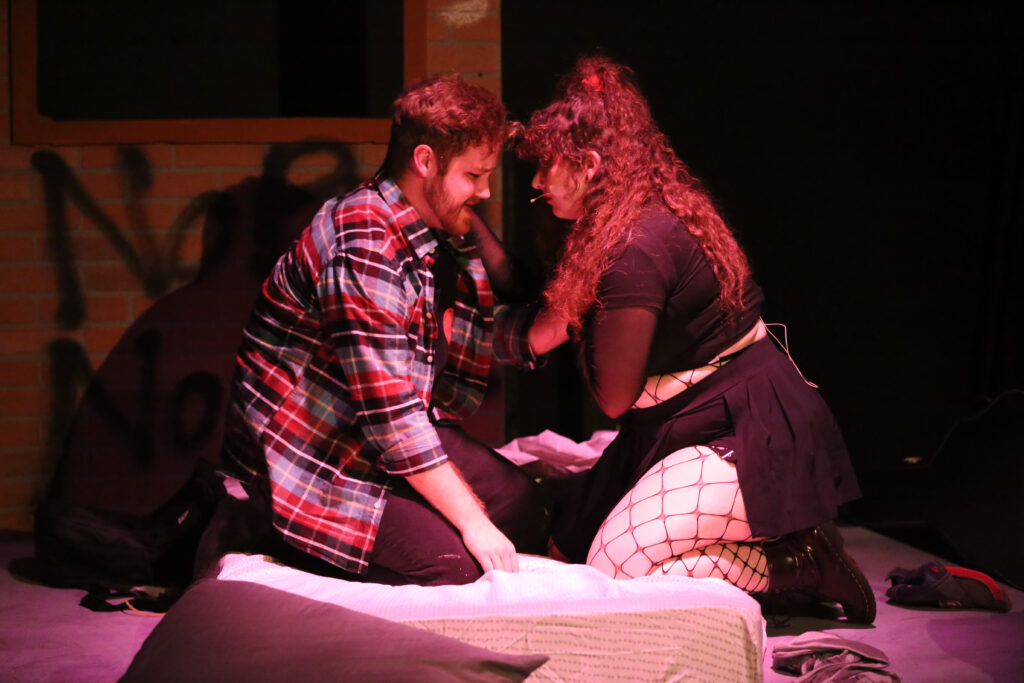
Tenenbaum becomes a forceful match for Johnny. At first, seductive Whatshername is misguided, then she grows bolder and more resourceful before she’s gone. In one of the show’s best numbers, Tenenbaum is a standout in the company’s “21 Guns.” She then leads the women in a feisty “Letterbomb.”
Trouble always comes by when St. Jimmy is around, and those pesky drugs that Whatshername is a willing participant in taking. She’s in the number with St. Jimmy and Johnny “Last Night on Earth.”
Bee Mecey is full of swagger as St. Jimmy, equal parts cocky and creepy. Mecey leans into the bombastic, snarling delivery of the vocals, and is an unremorseful ‘son of a gun’ in “The Death of St. Jimmy.”
Tunny joins the military, recruited for the Army by Favorite Son (a noteworthy Jordan Ray Duncan, who bears a striking resemblance to actor Paul Dano). DaCosta and Duncan are powerful in “Are We the Waiting,” joined by others, then they discover they are in for a rude awakening.
These scenes of combat and convalescences are the most powerful. After he is severely wounded in the War on Terror, Da Costa’s torment is palpable, and he agonizes about a crazy world — “Before the Lobotomy.” He attempts to adapt with help from the compassionate Spann, whose silky voice soars in “Extraordinary Girl.”
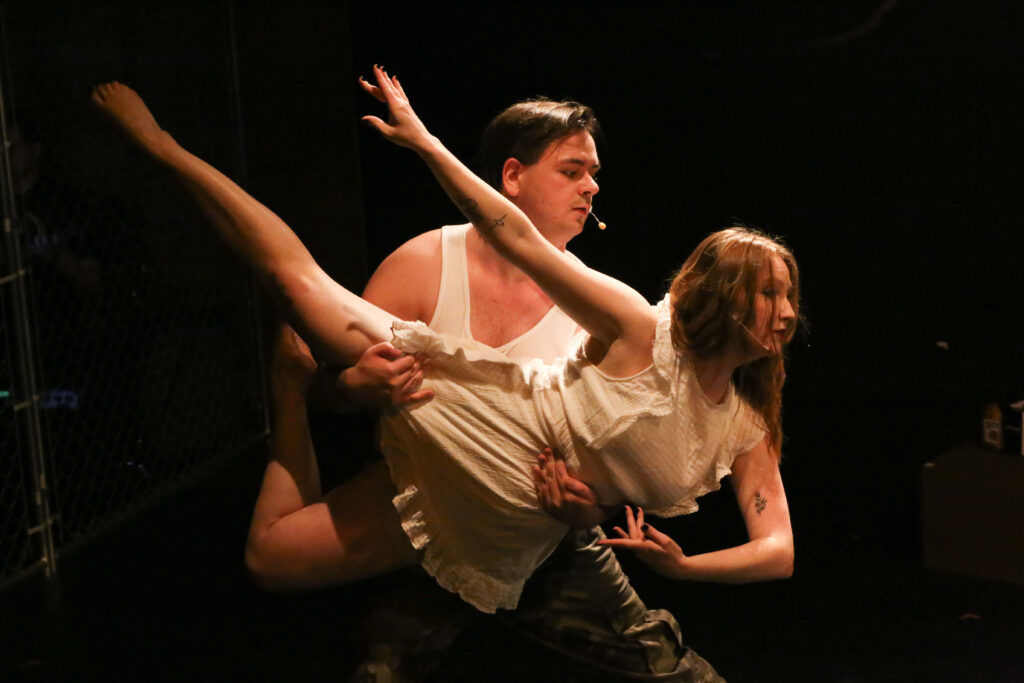
Bryant displays his shock at becoming a father when his girlfriend Heather (Parker) becomes pregnant. They clash as they deal with parenthood, and Parker is moving as she wrestles with Will’s lack of interest and the demands of a baby.
Parker’s sturdy vocal work is impressive as she delivers a rollercoaster of emotion. Her “Dearly Beloved” is a cry for help, her exasperation evident, while “Too Much Too Soon” reveals her frustration and desperation, and in a defiant “Rock and Roll Boyfriend,” she clearly has moved on from Will dragging her down.
As the characters grow, the band of brothers reunite for “We’re Coming Home Again,” and Johnny is sincerely regretful in “Whatshername.”
The zealous company includes Gabriel Anderson, Kaylin “Kat” Penninger, Alex Giordano, Amora Marie, Ian McCreary, Nathan Mecey, Hannah Renee and Vanessa Simpson. They do a fine job raging at the machine.
Anderson and Penninger are impressive as graceful and skilled featured dancers, and they were also the dance captains. Choreographer Chelsie Johnston pushed a passionate intensity in the movements, which brought out the group’s fire and never let up.
The finale is effectively staged, having the cast sit or stand scattered on the floor, singing a heartfelt “Good Riddance (Time of Your Life).” It is a surprisingly emotional ending after the group has poured out their hearts and souls into this rousing material.
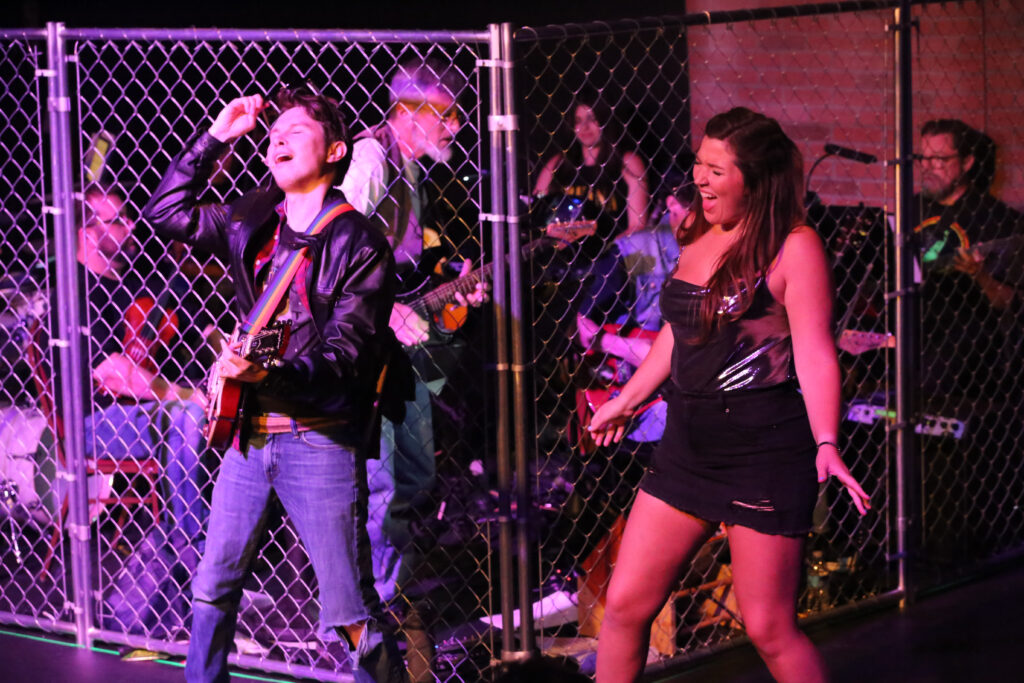
Green Day was organized by lead vocalist and guitarist Billie Joe Armstrong in the Bay Area of California in 1987, and musicians Mike Dirnt (bassist) and Tre Cool (drums) came aboard awhile later. They are best known as a rock band that brought punk out of the underground and into the mainstream, starting with breakout success in 1994.
Thirty years later, they’ve sold 75 million records worldwide, been nominated for 20 Grammy Awards, winning five, and were inducted into the Rock ‘n Roll Hall of Fame in 2015, their first year of eligibility.
Bassist John Gerdes’ pulsing power chords are a definite highlight, as are the strings that add so much – violin, viola and cello, along with the robust rock beats of the guitars and drums.
The musicians are a tight group that maintained a driving pace important to the Green Day sound, and carry out the throbbing musical arrangements and orchestrations by Broadway composer Tom Kitt
Gerdes was an outstanding music director, capably getting the best from conducting Chelsea Zak on keyboards (also assistant music director), Adam Rugo and Xander Gerdes on guitars, Jake Luebbert on drums, Steve Frisbee on violin, Mallory Golden on viola, and Marie Brown alternating with Michaela Kuba on cello.
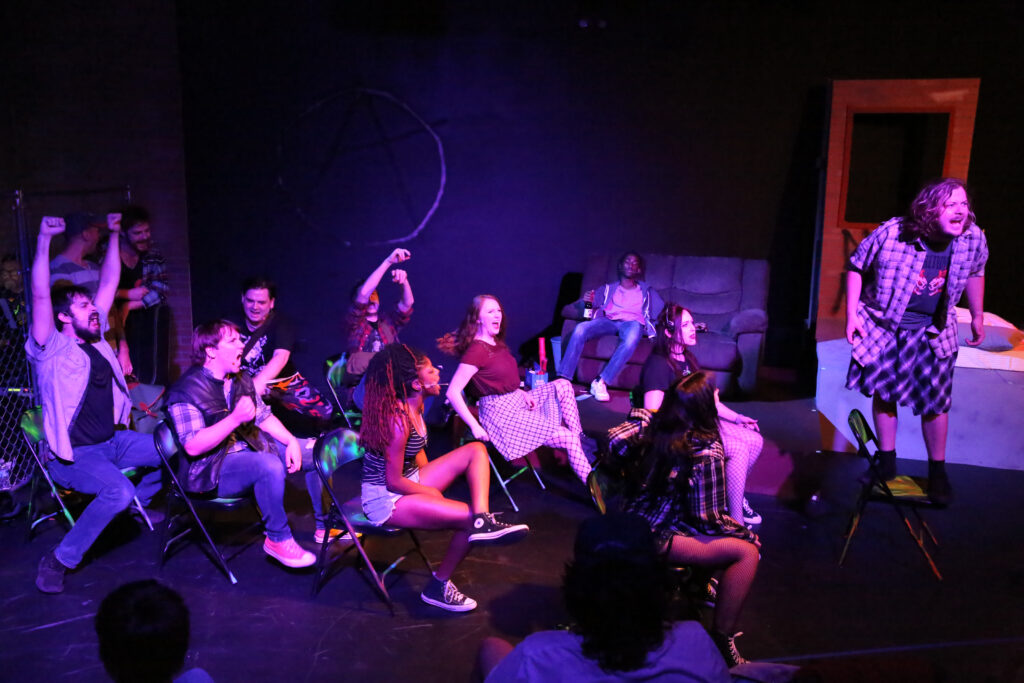
Ryan Day’s sound design is bold, Ryan Thorp’s lighting design is effective, Lauren Smith Bearden’s costume design captures the club scene and scruffy daily casual. Rob Lippert’s scenic design sets up three distinct areas for the action, with minimal set pieces.
Nathan Mecey put the pieces together as tech director, Mallory Golden mastered the props, and Ashwini Arora was the intimacy coordinator. Gabriel Scott Lawrence is listed as the directing intern.
Every generation has its seminal rock operas – like the Boomers’ “Hair” and “Tommy,” Gen X’s “Rent” and Millennials’ “Spring Awakening.” Millennials identify with Green Day, although there are shades of Gen X’ers too, so its multi-generations.
This cast shows their bond as mostly Gen Z’ers presenting a specific era. It’s hard to think of “American Idiot” as a period piece, for it remains relevant with its blistering screeds and hopeful ballads.

With a complexity that you may not have thought about while hearing the music in radio play or through sound systems, “American Idiot” shakes things awake in a rant against complacency and manipulation – and that can be heard loud and clear at any age.
New Line Theatre presents “American Idiot” from Sept. 12 to Oct. 5 on Thursdays through Saturdays at p.m. at the Marcelle Theatre, 3310 Samuel Shepard Drive, St. Louis. There is no performance Sept. 14. This 90-minute show is presented without intermission and is the 33rd season opener.
Tickets: Metrotix: 314-534-1111 or visit the Fox Theatre box office or the MetroTix website. Discounts: for students, educators and military. For more information, visit www.newlinetheatre.com.
There are 10 free seats for every performance that are open to any college student with a valid student ID. It is valid only at the door.
There is a lighted parking lot across the street from the theatre, and there is lots of free street parking. There is no dress code and there are refreshments available in the lobby, including alcohol.


Lynn (Zipfel) Venhaus has had a continuous byline in St. Louis metro region publications since 1978. She writes features and news for Belleville News-Democrat and contributes to St. Louis magazine and other publications.
She is a Rotten Tomatoes-approved film critic, currently reviews films for Webster-Kirkwood Times and KTRS Radio, covers entertainment for PopLifeSTL.com and co-hosts podcast PopLifeSTL.com…Presents.
She is a member of Critics Choice Association, where she serves on the women’s and marketing committees; Alliance of Women Film Journalists; and on the board of the St. Louis Film Critics Association. She is a founding and board member of the St. Louis Theater Circle.
She is retired from teaching journalism/media as an adjunct college instructor.


![Personality Adds Pizzazz to a Peppery, Plucky ‘[title of show]’ from Prism](https://poplifestl.com/wp-content/uploads/2024/09/title-of-show-1-750x302.jpg)
